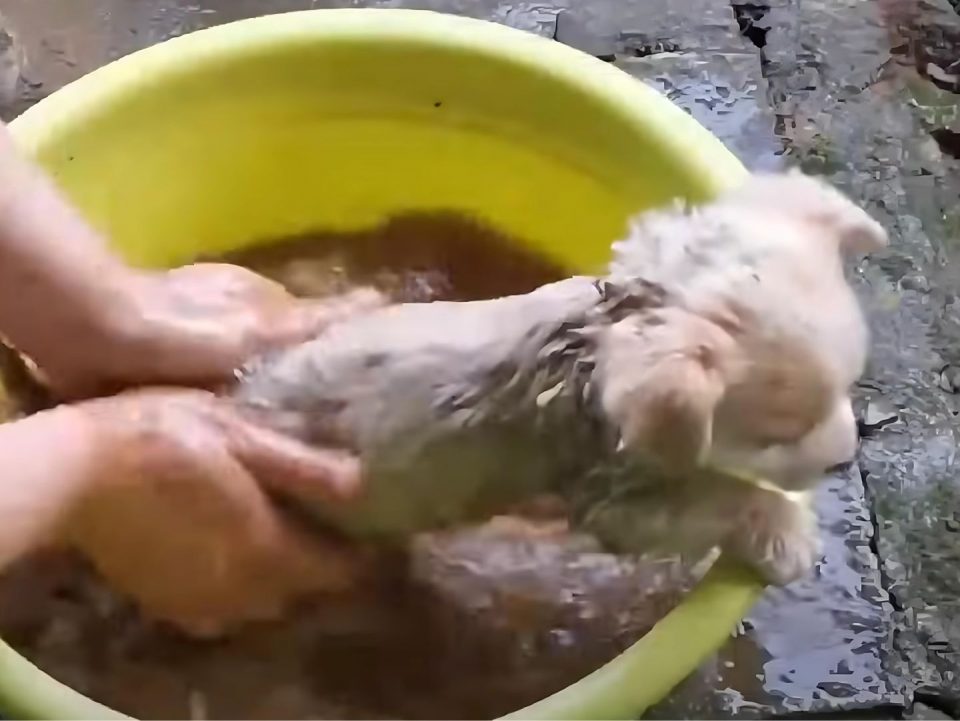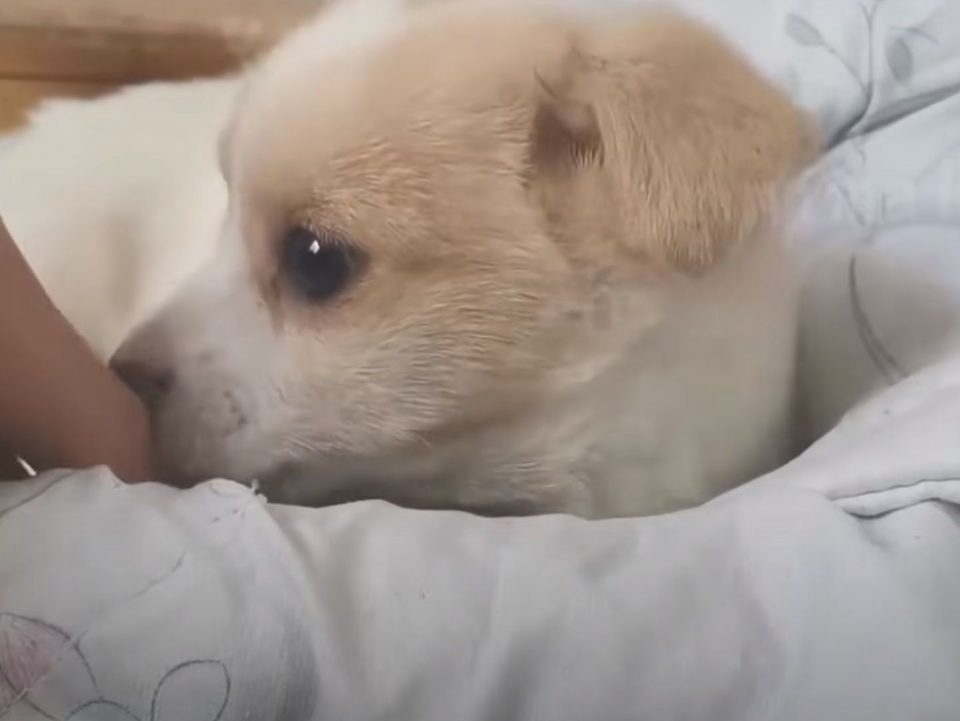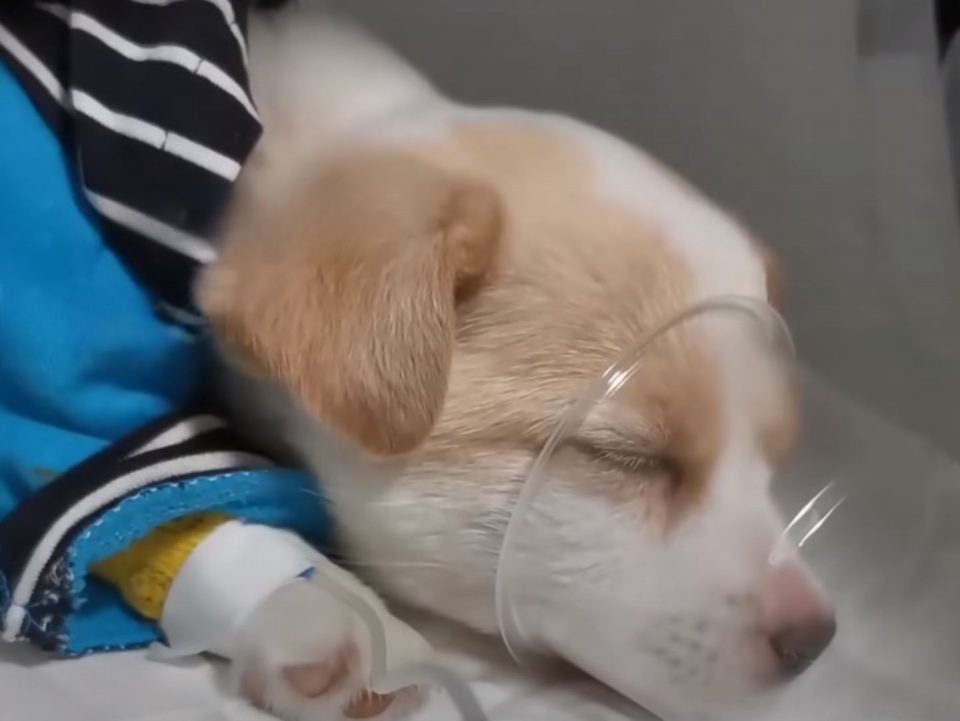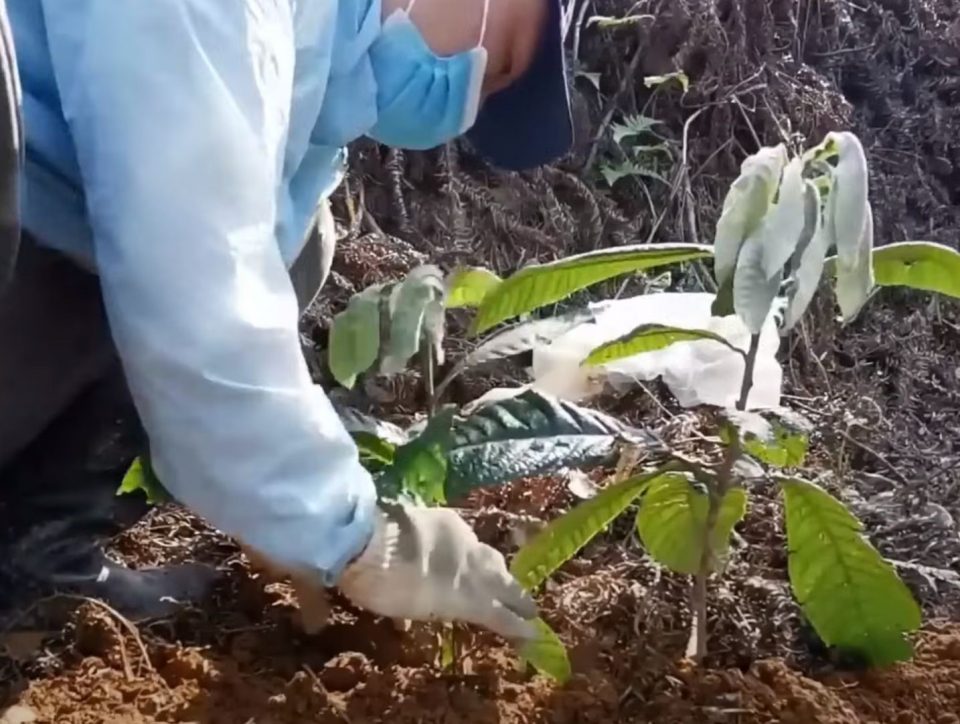When a man was riding his motorcycle around a very suburban area, from the corner of his eye, he noticed something strange rolling around in the long grass.
The man immediately stopped and decided to investigate. He soon found out that it was actually a puppy playing in the mud, having some fun.
The man suspected that he had been cruelly abandoned on the street and was forced to fend for himself.
Knowing that he could not just leave this shivering pup in the middle of nowhere, the man decided to take him home and offer him a second chance at life.
At Home

When they arrived at the man’s house, the pup was still shivering with fear, looking around and trying to figure out what was going on.
The man allowed the pup to settle a bit before giving him a much-needed bath since he was completely covered in mud.

While he was preparing everything for the nice, warm bath, the pup decided to explore his new home for a bit and even found time to sunbathe.
It took the rescuer some time in order to get the pup completely clean, but when he did, he was shocked at just how adorable this dog was.

When he was nice and dry, the man thought that it was time for the pup to take a nap; however, the pup had a different plan.
Because he probably hadn’t eaten in a very long time, the pup refused to fall asleep and made it clear that he was starving.
Luckily, the man immediately picked up on this and made his way down to the local market in order to buy everything he needed to make this little pup the yummiest meal ever.

The man rushed to get home as soon as possible so that his puppy could finally fill up his belly.
The meal was ready in no time, and the pup finished the entire bowl!
After his yummy meal, the pup couldn’t hide his happiness. He was jumping all around and enjoying his new life.
However, he soon had to settle down, as bedtime approached.

Unexpected Events
In the middle of the night, the man was awoken by the barks of the puppy.
He immediately got up and went to check on him. Unfortunately, the pup threw up all of the food and was calling the man for some assistance.

He immediately cleaned everything up, took the pup in his lap, and comforted him.
The next morning, the man was eager to see if the pup was feeling any better. He started playing with him, but the puppy was just not in the mood.
He then decided to make him some breakfast, thinking that he was maybe hungry. But, when the pup refused his meal, the man knew the situation was serious.

He immediately took the pup to the hospital, where he received a thorough checkup and was diagnosed with canine parvovirus.
Unfortunately, the parvovirus was so serious that the pup had to stay at the hospital for close observation.
Even though the vet said that it was highly unlikely for the pup to make it, the man decided that he would not give up.

As soon as he came home, he started preparing his house for the pup’s return, making it as comfortable as possible.
The very next day, the man visited the pup, who was still in very critical condition. He decided to stay by his side, making sure that he knew he was not alone.
Unfortunate News
Sadly, the treatment did not work, and the pup passed away in the hospital.
His rescuer was completely heartbroken. Even though they had known each other for such a short time, he became very attached to the sweet pup.
However, he decided to do one more thing for him. He took him back home and buried him in his garden next to two loquat trees so that, as they grow, the pup could be with him forever.

I would like to take this opportunity to thank this incredible man for trying his very best to save this pup. And, even though he didn’t make it in the end, I am sure that you gave him the best moments of his entire life.
And, that is worth everything.
If your furry friend can’t seem to stop scratching, you’re not alone in facing this common canine conundrum. It’s no fun watching your dog itch incessantly, and it can leave you feeling puzzled about the root cause of their discomfort. As a seasoned dog enthusiast, you’re well aware of how frustrating it can be to see your pup in this state. Understanding why your dog is itching so much is the first step towards finding relief for your beloved pet.
You’ve probably noticed your dog’s constant scratching and wondered what could be triggering this behavior. It’s essential to delve deeper into the reasons behind their itchiness to ensure they’re happy and healthy. As a devoted dog owner, you want to provide the best care for your four-legged companion, and unraveling the mystery behind their itching is crucial for their well-being.
Understanding the Itch: Common Causes of Dog Scratching
Allergies as a Major Culprit
Allergies are a common cause of your dog’s excessive scratching. Just like people, dogs can be allergic to various substances like pollen, mold, or even certain foods. These allergies can manifest as skin irritation, leading your furry friend to scratch incessantly. It’s essential to identify and address these allergies to provide relief to your pup.
Parasites That Trigger Itching
Parasites such as fleas, ticks, and mites are notorious for causing itching in dogs. These tiny creatures can wreak havoc on your dog’s skin, leading to discomfort and itching. Regular parasite prevention and grooming are crucial in keeping these unwelcome guests at bay and ensuring your dog’s skin remains healthy and itch-free.
Skin Infections and Inflammatory Conditions
Skin infections and inflammatory conditions can also be behind your dog’s scratching woes. Issues like bacterial or yeast infections, as well as conditions like dermatitis, can cause intense itching. Proper diagnosis and treatment by a vet are essential to address these underlying problems and help your dog find relief from the constant itchiness.
Diet and Nutrition: How Food Can Cause Itching
Identifying Food Allergies in Dogs
Food allergies can be a common cause of excessive itching in dogs. Just like humans, dogs can develop allergic reactions to certain foods. If your dog is constantly scratching, it might be due to a food allergy. Watch out for signs like skin irritation, redness, or gastrointestinal issues after eating specific foods. Consulting your vet for allergy testing can help identify the culprit and improve your dog’s comfort.
The Role of a Balanced Diet in Skin Health
A balanced diet plays a crucial role in maintaining your dog’s skin health and reducing itching. Providing high-quality, nutritious food can help prevent skin issues and allergies. Ensure your dog’s diet includes essential nutrients like omega-3 fatty acids, vitamins, and minerals. These nutrients support healthy skin and a shiny coat, reducing the chances of itching. Remember, a well-balanced diet is key to keeping your dog happy and itch-free.
Environmental Factors Contributing to a Dog’s Itchiness
Seasonal Changes and Your Dog’s Skin
During different seasons, your dog’s skin may react differently to environmental changes. In hot, humid weather, increased moisture can promote yeast and bacterial growth, leading to skin irritation and itching. On the other hand, dry and cold seasons can cause your dog’s skin to become dry and flaky, exacerbating itchiness. Regular grooming and adjusting your dog’s care routine based on seasonal variations can help alleviate itchiness caused by these environmental factors.
Household Irritants to Watch Out For
Your home may harbor various irritants that can contribute to your dog’s itchiness. Common household irritants include harsh cleaning chemicals, perfumes, and air fresheners. These substances can irritate your dog’s skin upon contact, causing itching and discomfort. Additionally, pollen brought in from outside can trigger allergies in some dogs, leading to itching. To reduce your dog’s exposure to these irritants, opt for pet-friendly cleaning products, avoid using strong scents around your dog, and regularly clean your dog’s living areas to minimize allergen buildup.
Psychological Reasons: When Itching is More Than Skin Deep
Stress-Related Scratching in Dogs
Stress can manifest in physical symptoms in dogs, and one common sign is increased itching. Just like us, dogs can experience stress from various factors like changes in routine, loud noises, or being left alone for long periods. This stress can lead to excessive scratching. If your furry friend is showing signs of stress-related itching, creating a calm environment, providing comforting routines, and spending quality time together can help reduce their anxiety and alleviate the itchiness.
Boredom and Behavioral Itching
Dogs, like humans, can get bored, and when they do, they may resort to behaviors like scratching to pass the time. If your dog is itching excessively due to boredom, increasing physical activity and mental stimulation through interactive toys, puzzles, or engaging playtime can help redirect their focus and decrease the urge to scratch. Ensuring your dog has enough exercise and mental enrichment can not only alleviate boredom-related itching but also improve their overall well-being.
Diagnosis and Treatment: Finding Relief for Your Itchy Dog
Veterinary Diagnostics: Getting to the Root of the Problem
When your dog is scratching excessively, it’s essential to seek veterinary help for a proper diagnosis. Your vet may conduct various tests to identify the underlying cause of your dog’s itchiness. These tests could include skin scrapings to check for mites or skin infections, blood tests to detect allergies, or even a diet trial to determine food sensitivities. By pinpointing the root cause, your vet can recommend the most effective treatment for your furry friend.
Available Treatments and Remedies for Itchiness
Once the cause of your dog’s itching is identified, your veterinarian will suggest suitable treatments. These may include medications to alleviate symptoms such as antihistamines for allergies, flea control products, antibiotics for skin infections, or medicated shampoos. In cases of severe allergies, your vet might recommend immunotherapy or steroids. Additionally, they may advise changes in your dog’s diet or environment to manage the condition effectively. Following your vet’s recommendations diligently can help provide relief to your itchy canine companion.
The Role of Grooming and Ongoing Care
Bathing and Grooming Essentials
When dealing with your itchy dog, bathing and grooming play essential roles in maintaining skin health. Regular baths with a gentle dog shampoo help remove allergens and irritants, keeping your dog’s coat clean and reducing itching. Brushing your dog helps distribute natural oils, preventing dry skin that can lead to increased scratching. Trimming your dog’s hair, especially around paws and ears, can also reduce irritation and potential infections.
Preventative Measures to Reduce Itching
To reduce itching, consider precautionary measures in your dog’s environment. Regular vacuuming and washing bedding can help eliminate environmental allergens. Using hypoallergenic detergents for your dog’s bedding and clothing can prevent skin irritation. Maintaining a balanced diet rich in essential nutrients supports your dog’s overall health, including skin condition, potentially reducing itching. Regular veterinary check-ups aid in early detection and treatment of underlying issues contributing to your dog’s itching.
Remember, proactive grooming and ongoing care are key to minimizing your furry friend’s itching and promoting their comfort and well-being.
Conclusion
So, there you have it – a comprehensive look into why your furry friend might be scratching so much. From allergies to stress, parasites to boredom, there are various reasons behind your dog’s itchiness. Remember, seeking help from a vet is crucial for a proper diagnosis and treatment plan. By addressing the root cause and following your vet’s advice, you can help your dog find relief and improve their overall well-being. Whether it’s adjusting their environment, trying out different medications, or maintaining good grooming practices, taking proactive steps can make a big difference in managing your dog’s itching. Keep your pup comfortable and happy by staying informed and attentive to their needs.
Frequently Asked Questions
What are some common causes of excessive scratching in dogs?
Excessive scratching in dogs can be caused by allergies, parasites, skin infections, food allergies, environmental triggers like seasonal changes and household irritants, psychological factors such as stress and boredom, and underlying health issues.
How can I help my dog with stress-related scratching?
To help with stress-related scratching, create a calm environment for your dog, provide mental stimulation through interactive toys or puzzles, ensure regular exercise and playtime, and consider consulting with a veterinarian for additional guidance or behavior modifications.
What diagnostic tests may be conducted by a veterinarian for an itchy dog?
Veterinarians may conduct skin scrapings, blood tests, skin allergy testing, and dermatological examinations to diagnose the underlying cause of an itchy dog’s scratching behavior and determine the most appropriate treatment plan.
What treatments and remedies are available for an itchy dog?
Treatments for an itchy dog may include medications, flea control products, antibiotics for skin infections, dietary changes, environmental modifications, and topical solutions, depending on the underlying cause identified by the veterinarian.
How important is grooming for managing an itchy dog?
Regular grooming practices such as bathing with gentle dog shampoo, brushing to distribute natural oils, and trimming hair can help reduce irritation and manage itchiness in dogs, promoting skin health and overall comfort.
[no_toc]

Hey there, I’m Janet Brooks, a dog-loving student from California. I’m all about helping pups in need, especially those without homes. Me and my awesome friends work together to give shelter and love to stray dogs. Oh, and I also write blogs about dogs to share helpful info.